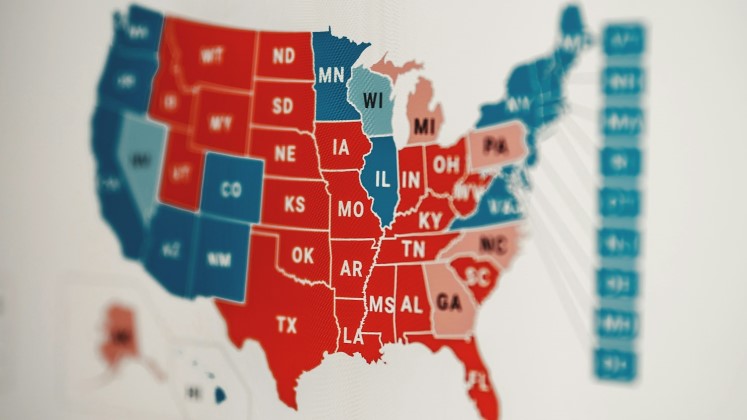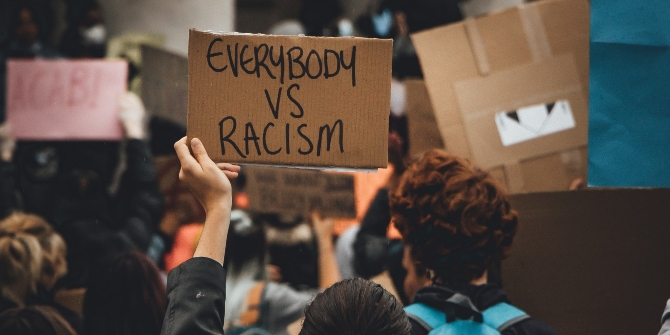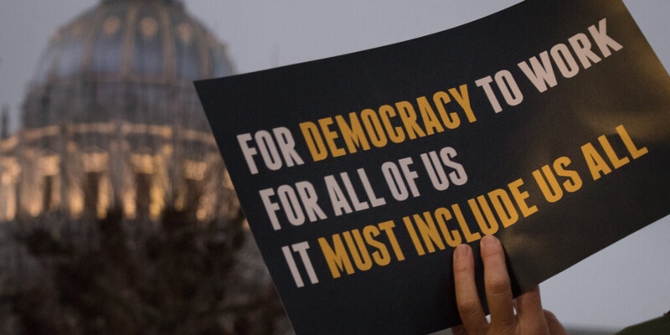 The US Supreme Court has finished its 2023/24 term with several extraordinarily consequential rulings. Lauren C. Bell looks at the decisions in Loper Bright Enterprises v. Raimondo, the ‘Chevron deference’ case, and Trump v. United States, which covers presidential immunity. She writes that the Loper decision weakens executive branch agencies and dramatically expands the reach of the courts, putting them squarely in the middle of federal policy implementation. The Trump immunity ruling, meanwhile, puts the conservative majority’s collective thumb on the scales of justice, by holding that presidents have immunity from criminal prosecution for official acts.
The US Supreme Court has finished its 2023/24 term with several extraordinarily consequential rulings. Lauren C. Bell looks at the decisions in Loper Bright Enterprises v. Raimondo, the ‘Chevron deference’ case, and Trump v. United States, which covers presidential immunity. She writes that the Loper decision weakens executive branch agencies and dramatically expands the reach of the courts, putting them squarely in the middle of federal policy implementation. The Trump immunity ruling, meanwhile, puts the conservative majority’s collective thumb on the scales of justice, by holding that presidents have immunity from criminal prosecution for official acts.
Some Supreme Court terms end with few significant decisions; others are more consequential, with a handful of landmark cases decided. And then there is the truly extraordinary term that just concluded, in which the Court, among other things: largely declined to extend First Amendment protection to commenters on public officials’ private social media accounts; limited the Second Amendment rights of those who pose a credible threat to others, while overturning the Bureau of Alcohol, Tobacco, and Firearms’ rule prohibiting “bump stocks,” which increase the rate of fire for semiautomatic weapons; declined—for now—to ban the use of the abortion drug mifepristone; and said that gifts given to thank a public official for official actions do not constitute bribes.
In a normal year, this would already be a large number of major cases. But the list above excludes the two most significant decisions of the term: in Loper Bright Enterprises v. Raimondo the Court struck a blow against both the federal bureaucracy and the US Congress and in Trump v. United States, the Court for the first time in its history decided that presidents have immunity from criminal prosecution for official acts—and then declared that virtually all presidential actions should be presumed to be official.
Coming as it did just one business day later, the Court’s decision in Trump v. United States quickly knocked Loper Bright out of the headlines. But Loper Bright is likely the more consequential decision, at least in terms of its broad applicability to nearly all aspects of the US government. The decision upends decades-old administrative processes, hobbles the executive branch, and sows seeds of chaos in the federal policymaking process.
Loper Bright Enterprises v. Raimondo
In 2020, a group of small, family-owned herring fisheries sued the US Secretary of Commerce following the Commerce Department’s ruling that the fisheries themselves were required to pay for required “at-sea” observers required by the National Marine Fisheries Service to ensure the fisheries’ compliance with federal law. The fisheries argued that while Congress mandated that there be observers on their fishing boats, Congress did not require that the observers be paid for by the companies themselves. The National Marine Fisheries Service argued that Congress was vague about how the observers should be compensated, and that as a result, directing the fisheries to pay for their presence was reasonable.
Using the tests developed in the Supreme Court’s forty-year old precedent in Chevron v. Natural Resources Defense Council, the lower courts affirmed that the Commerce Department could require the fisheries to pay the costs of the observers, since Chevron required that when a congressional statute was vague, courts should defer to agency interpretations of the law, as long as the interpretation was reasonable. Citing precedent, the Loper Bright decision sums up Chevron deference as: “’a presumption that Congress, when it left ambiguity in a statute meant for implementation by an agency, understood that the ambiguity would be resolved, first and foremost, by the agency, and desired the agency (rather than the courts) to possess whatever degree of discretion the ambiguity allows.”’
The Court’s decision in Loper Bright eliminates the presumption that US federal agencies are empowered to interpret vague statutory language without interference by the federal courts. Instead, the Court declared that federal courts must weigh in, declaring in the majority opinion: “Chevron’s presumption is misguided because agencies have no special competence in resolving statutory ambiguities. Courts do. The Framers, as noted, anticipated that courts would often confront statutory ambiguities and expected that courts would resolve them by exercising independent legal judgment.”
The practical effect of the court’s decision in Loper Bright is that virtually all executive branch agency decisions—past, present, and future—are potentially up for review. This may be of little concern to the Supreme Court, which has control over its own docket and generally only grants oral argument in approximately one percent of the cases appealed to it. But the lower federal courts are almost certain to be flooded with challenges to agency decisions. Moreover, deciding these cases will take longer, given that under Loper Bright, the courts can no longer simply defer to the agencies’ interpretations of the statutes involved. Congress could solve this problem, in theory, by drafting statutes that are much clearer in articulating how agencies should implement them, but Congress already suffers from a lack of capacity; furthermore, Congress lacks the expertise located in the agencies, where there are hundreds of experts with, collectively, decades or even centuries of experience. Of course, the courts also lack scientific and technical expertise of the kind that generally informs bureaucratic decision-making, which begs the question of how they will be able to decide many of the questions that will be before them.

Photo by Ian Hutchinson on Unsplash
Trump v. United States
Speaking of agency experts, imagine a President who decides to fire long-time Civil Service experts to install personal loyalists to carry out a set of illegal programs. Under the most anticipated ruling of the term, the Court’s decision in the Trump presidential immunity case, the President would likely be immune from criminal prosecution, even after leaving office. While the Court stopped short in Trump v. United States of wholesale agreement with former President Trump that former presidents are immune from criminal prosecution for any and all actions they take while in office, the Court nevertheless granted sweeping immunity. In Trump v. United States, the Court held that presidents enjoy immunity from criminal prosecution for official acts—and further held that most presidential acts are, or should be presumed to be, official. The Court did note that when presidents engage in unofficial acts they enjoy no immunity from criminal prosecution—but then declared that the hurdle for prosecutors to demonstrate that an act is unofficial is a high one.
There are several ways in which Trump v. United States is striking. For one thing, the majority opinion—nominally written by Chief Justice Roberts—seems to violate the Chief’s general approach to deciding cases (narrowly) and writing opinions (collegially). Elements of the prose are stylistically more characteristic of others in the majority, which hints that the Chief may have been incorporating more strident views than his own and, along with other indicators, further hints that another casualty of the Court’s recent decisions might be the mutual loyalty that has tended to characterize the relationships between the justices even when they disagree.
More significantly, however, when the Court agreed to hear the case in late February, it limited the argument to the following question: “Whether and if so to what extent does a former president enjoy presidential immunity from criminal prosecution for conduct alleged to involve official acts during his tenure in office?” The court’s written opinion went far beyond simply addressing this question in a way that would be broadly applicable to any former president (despite the majority taking pains to note the decision’s general applicability). Instead, it offered extensive commentary on the specific alleged acts involving former President Trump, putting the conservative majority’s collective thumb on the scales of justice, even as the Court directed US District Court Judge Tanya Chutkan, who is overseeing the trial of former President Trump on criminal charges related to election interference and January 6th, to sort out which of Trump’s acts were official and which were unofficial.
Since the Trump immunity decision came down, many major newspapers, political commentators, and good government advocates have exploded in their outrage over the decision, calling the decision “horrific” and declaring that the decision presents an existential threat to American democracy. Conservative think tanks like the Heritage Foundation, on the other hand, have applauded the Court. Notably, all of these responses ignore the potential downside for candidate Donald Trump; the next several months of judicial fact-finding about his conduct following the 2020 presidential election will give voters greater opportunity to determine whether they believe he acted in accordance with his official presidential duties.
The Imperial Judiciary?
Nevertheless, together the two decisions embolden the President while weakening the presidency. The framers of the Constitution might have intended energy in the executive, as Chief Justice Roberts’ claims in Trump v. United States, but it is hard to believe that the Founders would have wanted the courts to abdicate their responsibility to check presidential power. In Federalist Paper #78, Alexander Hamilton cautioned that “liberty can have nothing to fear from the judiciary alone, but would have everything to fear from its union with either of the other departments.” The Court’s decision in Trump v. United States certainly seems to be establishing just the sort of union between the judicial branch and the chief executive the framers feared.
At the same time, Loper Bright Enterprises v. Raimondo weakens executive branch agencies and puts the courts squarely in the middle of federal policy implementation. Beyond weakening the executive branch, this is also a dramatic expansion of the federal courts in the political system. To paraphrase Justice Sotomayor’s dissent in Trump v. United States, the future of much of American governance looks to be the courts, the courts, the courts.
All of this comes at a time when public opinion of the Supreme Court is near historic lows, with fewer than 30 percent of respondents to a late June 2024 poll—before the Court handed down Trump v. United States—believing that the Court “these days” is likely to provide a fair and impartial check on the other branches. The proliferation of scandals involving lavish gifts, coveted concert tickets, and the flying of “Stop the Steal”-related flags has taken its toll. But it has not, apparently, given the justices much pause at all.
- Please read our comments policy before commenting.
- Note: This article gives the views of the author, and not the position of USAPP – American Politics and Policy, nor the London School of Economics.
- Shortened URL for this post: https://wp.me/p3I2YF-e4a






